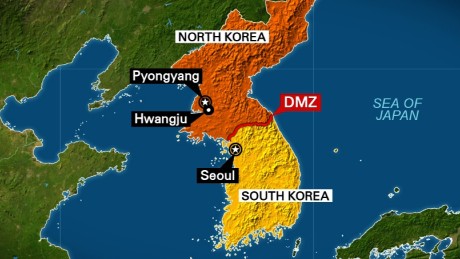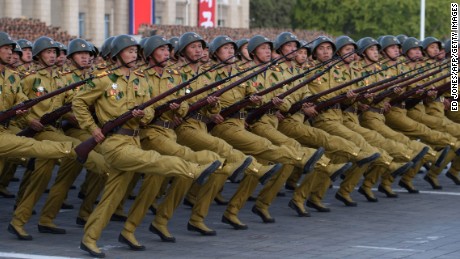Trump's saber-rattling is North Korea's propaganda dream come true
North Korea is a country prepared for conflict.
Still technically at war with its southern neighbor, ordinary North Koreans are warned to be in a state of constant vigilance to threats from the outside, particularly from the US.
Those fears seemed to be confirmed this month, after US President Donald Trump launched a surprise strike on a Syrian airfield and dispatched a naval battle group -- which he described as "an armada" -- to northern Asia.
Trump's saber-rattling -- he has accused Pyongyang of "looking for trouble" -- is familiar to consumers of North Korean state media, who have been warned for decades by their leaders of imminent US attack and attempted regime change.
"The aggressive acts of war on the part of the United States are getting increasingly reckless," a North Korean official told CNN in Pyongyang this week.
"In response, we will continue to strengthen our self-defense capability."
Tragic history
Looking at the country's history, paranoia over a potential US attack is understandable.
It's estimated that during the Korean War, American planes dropped some 625,000 tons of bombs on North Korea -- more than during the entire Pacific theater of World War II -- including 32,000 tons of napalm.
Around 600,000 North Korean and 1 million South Korean civilians were killed, along with hundreds of thousands of troops. Curtis LeMay, an air force commander at the time, estimated in 1988 that US planes killed 20% of the population "over a period of three years or so."
According to Blaine Harden, author of "The Great Leader and the Fighter Pilot," Kim Jong Un, like his father and grandfather before him, "(has) kept memories of the war and the bombing terrifyingly fresh. State media warn that, sooner or later, the Americans will strike again."
To this end, North Korea maintains a massive standing army of more than 1.2 million soldiers, with millions more paramilitary troops and reservists, according to the International Institute for Strategic Studies (IISS).
South Korea also maintains a high state of alert, with more than 500,000 people in its armed forces, IISS says, plus the thousands of US troops deployed in the country.
The North Korean constitution states that "national defense is the supreme duty and honor of citizens," and the country is governed by the "songun" -- or military-first -- policy, which places the armed forces above all else.
In recent years that has meant huge investment in the development and deployment of nuclear weapons and long-range ballistic missiles.
Paranoia
Intense focus on the military in a cripplingly poor country like North Korea can cause much hardship, but Pyongyang justifies its policies based on a narrative of imminent threat from foreign forces.
That narrative was on clear display this week, with North Korean state media -- which usually tightly controls information about the outside world -- going big on the deployment of the USS Carl Vinson and Trump's surprise strike in Syria.

USS Carl Vinson heads to Korean Peninsula
One Pyongyang resident told CNN, "we're at the brink of war, but if that happens, we'll all go to the front lines to fight the Americans."
The regime has held up Trump's actions in Syria, as well as those of his predecessors in Iraq and Afghanistan, as justification for seeking to further the North Korean nuclear weapons program, which it claims is vital for defense.
"Previous US administrations have been attacking those countries who haven't gotten nuclear weapons, and the Trump administration is no different from previous US governments in pinpointing those non-nuclear states," a North Korean official told CNN.
Pyongyang fears that if it was not nuclear armed, it would suffer the same fate as Syria and plunge into chaos and civil war.
Relative calm
South of the border, the situation is much different. On Tuesday, officials sought to reassure South Koreans that the US would not take unilateral action against North Korea without consulting Seoul.
"The United States makes it clear that it will not take a new policy or measure without consultations with us," South Korean Foreign Ministry spokesman Cho June-hyuck told reporters.
Defense Ministry spokesman Moon Sang-gyun warned people against being "blinded by exaggerated assessments on the security situation of the Korean Peninsula."
Moon Jae-in, leader of the opposition Democratic Party and frontrunner to be the country's next President, said on Facebook that there "should never be a pre-emptive strike without South Korean consent."
"Neighboring countries are taking advantage of the absence of a president in South Korea to try to exclude us and handle issues on the Korean Peninsula according to their own understanding," Moon said.
The country's former President, Park Geun-hye, was impeached after a corruption scandal.
On the streets of Seoul, South Koreans who spoke to CNN were far less worried about a potential of war than their northern neighbors.
"I do feel uneasy about North Korea provoking war," said Jeon Hyung-min, 26.
"But I don't think a US strike would happen and if North Korea can judge the situation, they will not continue any armed provocation for now."
Seo Deok-il, in his 70s, said he was "not anxious" about the news.
"I don't think war will break out," he said. "If I was scared, I would have immigrated to another country."
News Courtesy: www.cnn.com











